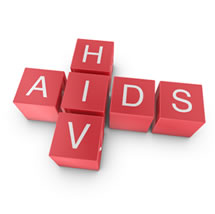
The Center for AIDS Research at Emory University (CFAR) received a five-year, $10 million award from the National Institutes of Health (NIH) to further its work in decreasing HIV incidence, improving the well-being of infected individuals, training the next generation of researchers and clinical leaders, and ultimately finding a vaccine and cure for HIV.
Part of a national network of 20 leading research universities supported by the NIH, CFAR provides administrative and shared research support to enhance and coordinate HIV/AIDS research and supports development of early career investigators pursuing HIV/AIDS research. Centers for AIDS Research compete for funding renewal every five years and must demonstrate continued research growth, achievement in addressing the AIDS epidemic, and provide evidence of an impact in the fight against HIV/AIDS.
CFAR at Emory University is co-directed by Carlos del Rio, MD, Hubert Professor and chair of the Department of Global Health at the Rollins School of Public Health, James W. Curran, MD, MPH, the James W. Curran Dean of the Rollins School of Public Health, and Eric Hunter, Ph.D., Georgia Research Alliance Eminent Scholar and professor of pathology and laboratory medicine at Emory University School of Medicine. For nearly two decades, CFAR has made significant strides in addressing the AIDS epidemic through clinical, basic, and prevention science.
"CFAR has been extremely successful in achieving its principal goal of first forming and then strategically expanding a university-wide, multidisciplinary community of scientists," explains Principal Investigator del Rio. "These renowned experts have led NIH-funded research resulting in globally recognized interventions that prevent new HIV transmissions and enhance the well-being of people living with, and at risk for, HIV."
Having a CFAR at Emory has been critical to growing HIV/AIDS research funding at Emory. When Emory received its first funding in 1997, the university had $11.3 million in HIV/AIDS research funding and ranked #23 in the nation. Now, Emory ranks sixth in the country for HIV/AIDS NIH funding, with $63.8 million in HIV/AIDS research support. Additionally, 20 percent of Emory's total NIH extramural funding is HIV/AIDS-related funding, contributing to a 63 percent growth in research funding since 2010.
"Over its 18-year history, the Center for AIDS Research at Emory has built an incredible research community and established a reputation as a center for excellence in HIV/AIDS research," says Curran. "This funding further reinforces the significance of our research and ensures our ability to continue critical work in the field."
"We are proud of our track record of cultivating and strengthening HIV/AIDS research for the past 18 years,” says Hunter. "Our world-class scientists are making a tremendous impact through their groundbreaking research and collaborative efforts. Through this continuation of NIH funding, we are able to move forward on our mission and intensify our efforts to reach our ultimate goals of developing an effective vaccine and finding a cure for HIV."
Notable grants awarded to CFAR investigators this past funding cycle include:
- The Emory Consortium for Innovative AIDS Research in Nonhuman Primates,aimed at optimizing and understanding the mechanism of protection for vaccines being tested in clinical trials.
- Emory-Duke-Orlando-CDC (EMDOC) Clinical Trials Unit, integrating four HIV/AIDS clinical research sites based in Atlanta (Ponce de Leon Center and Hope Clinic), Kenya and Thailand with the mission of advancing HIV/AIDS research and knowledge on prevention, vaccines, treatment, and cure. Info: http://www.ctu.emory.edu/
- Emory WIHS CRS – Longitudinal Cohort, the Emory Women's Interagency HIV Study Southern Regional Site. WIHS is an ongoing national study aimed at understanding the development of HIV infections in both treated and untreated women through recruiting participants and innovative research.
- Tuberculosis Research Unit (TBRU) is a consortium led by Emory, with partners at NYU, Tulane National Primate Center, La Jolla Institute of Allergy and Immunology, Aeras, DeKalb County Board of Health, Kenya Medical Research Institute and the CDC to improve understanding of TB immunity and contribute to its elimination. TB is often a co-infection of HIV in the global epidemic.
- CD40L Adjuvanted Clade C DNA and MVA HIV Vaccines, aimed at generating new vaccination approaches that enhance the quantity and quality of anti-viral responses, using adjuvant and boost strategies.
- Mobile Messaging Intervention to Present New HIV Prevention Options for MSM aims to provide new HIV prevention messages for men who have sex with men (MSM) and use an existing, comprehensive HIV prevention mobile app for MSM to test whether the provision of prevention messages in the context of broader prevention resources changes key risk and preventive behaviors among HIV-negative and HIV-positive MSM.
- Transcriptome Resources for Comparative Primate Models of Lentivirus Infection is developing a data set that will provide a comprehensive range of immune cell types and models of HIV/SIV infections. These data will serve as valuable new resources for many national studies of AIDS pathogenesis, prevention, and therapeutics. http://grantome.com/grant/NIH/R24-OD010445-01A1
Other significant accomplishments include:
- Fulton County Task Force on HIV/AIDS: Strategy to End AIDS in Fulton County: A task force aimed at decreasing the transmission of HIV within Fulton County and improving the quality of life for persons living with HIV infection.
- AIDSVu: An interactive online map illustrating the prevalence of HIV in the United States. The national, state and local map views on AIDSVu allow users to visually explore the HIV epidemic alongside critical resources such as HIV testing center locations, HIV treatment center locations, and NIH-Funded HIV Prevention & Vaccine Trials Sites.
- CFAR HIV Disease Registry: An effort spearheaded by the CFAR Clinical Research Core in partnership with the CFAR Biostatistics and Bioinformatics and Prevention Science Cores.
